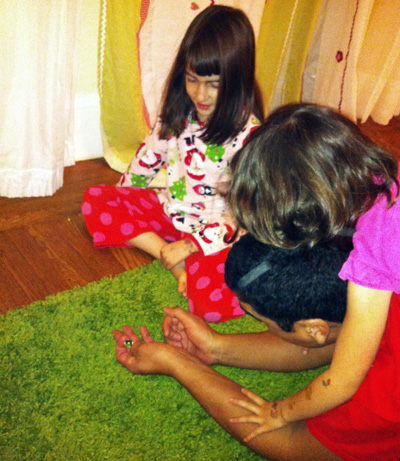Lately, my kids have had a lot of questions about language—why they have to take Spanish, why do we speak other languages. My four-year-old has also hit the typically four-year-old stage of really resisting my changing languages with her from English to Spanish. It makes her really angry and she will command me to “Speak English!” If a book happens to have a Spanish word in it, she will cover the page with her hand and tell me not to talk like that. It’s pretty typical of four year olds from everything I have read.
Sometimes they ask some pretty funny questions about language, like this conversation they had with their Dad last night.
Lila: Baba, how do you speak Arabic? Did you have a teacher who came everyday to teach you?
Moe (in Arabic): Because I grew up in Morocco.
Lila: So you went to Morocco on a trip and learned it?
Moe: (in Arabic) No, I lived in Morocco. My parents spoke to me in Arabic.
Lila: With a teacher?
Moe: (in Arabic) No, they only talked to me in Arabic. Like I talk to you in Arabic.
What was funny to me was they made a clear connection between having a teacher and learning a language, like they do with Spanish. But they made no connection with their father speaking to them only in Arabic and their ability to understand Arabic. Since Arabic is something that has always been a given in our house, they don’t think about in the same way that they do Spanish. Spanish is something they learn with a teacher, so they assume all languages are learned with a teacher. Somehow, their learning Arabic didn’t fall into that same category, probably because it has been a more natural process.
The next day, my four-year-old still seemed to be tossing all this language stuff around in her head.
“Did you speak Arabic as a little girl too, Mama?” Clearly, they are trying to make sense of language, where it comes from and its differences.





































Reminds me of a distinction Krashen makes between learning and acquiring a language. He claims that acquiring is unconscious, naturalistic setting etc while learning is taught in a classroom and conscious.
That makes perfect sense Anabelle! It’s always interesting to know the science behind my observations- thanks for sharing!
Firstly, I gotta say you’re doing a great job with this blog. I’ve been googling for days looking for a blog/website just like this one.
A couple quick questions, do your daughters speak Arabic fluently? and is their knowledge of it strictly from their dad speaking only Arabic to them? or do they take lessons as they do with Spanish? i am assuming you and your husband communicate in English, correct? are the kids ever confused when dad switches from english to arabic when speaking to them? or is that not an issue? finally, do you not mind when dad speaks arabic to the kids? i mean, do you not feel excluded?
To put my plethora of questions in context, I’ve been recently thinking about how I will make sure my kids speak Arabic fluently (i am Egyptian and speak it as a first language, and my wife is Canadian whose first language is English). We’ll be living in Canada for an undetermined period of time so their immediate environment will be anglophone.
If you’ve already answered most of these questions in a blog post, could you please refer me to it?
thanks a lot, and keep up the great work!
Hi Shady,
So glad my blog post was useful and good for you for wanting to teach your native language to your kids! My husband has been speaking Arabic with the kids from birth and they don’t take additional lessons. We are considering sending them to a local mosque on Sunday for more classical Arabic lessons though. We speak English (although originally we spoke French to each other before he spoke English-we met in Germany- and sometimes we’ll revert to French. But mainly that’s when we don’t want the kids to understand!) Kids don’t get confused with changing languages at all (even up to four or more!)-they can easily catch on with whatever circumstances present themselves language wise. Check out some of our Real Intercultural Families for inspiration! However despite my husband always speaking Arabic with them, they speak little Arabic (but understand 100%). I detailed the reasons for that in this post: https://www.incultureparent.com/2012/06/how-bilingualism-can-fail-in-multilingual-families/ I don’t feel excluded when my husband speaks Arabic, but I know I am not the norm with this. It’s probably because I have lived in many places where I didn’t understand or speak the language so got used to it. As a result, I don’t find it difficult that I don’t understand that much. But I definitely would love to learn Arabic and its one of my goals. Hope that helps and happy to answer anymore questions you have!
[…] Their ease with experimenting with the Spanish they know, and their ability to understand some of what was going on around them, also reassures me in relation to their Arabic. Since they speak Arabic so infrequently (but are spoken to in it by their father), I have wondered about their ability to communicate when we go to Morocco. Watching their facility with Spanish, I now have no doubt, their use of Arabic would likely be even more rapid than Spanish, since it’s the language their father has spoken to them since birth. […]